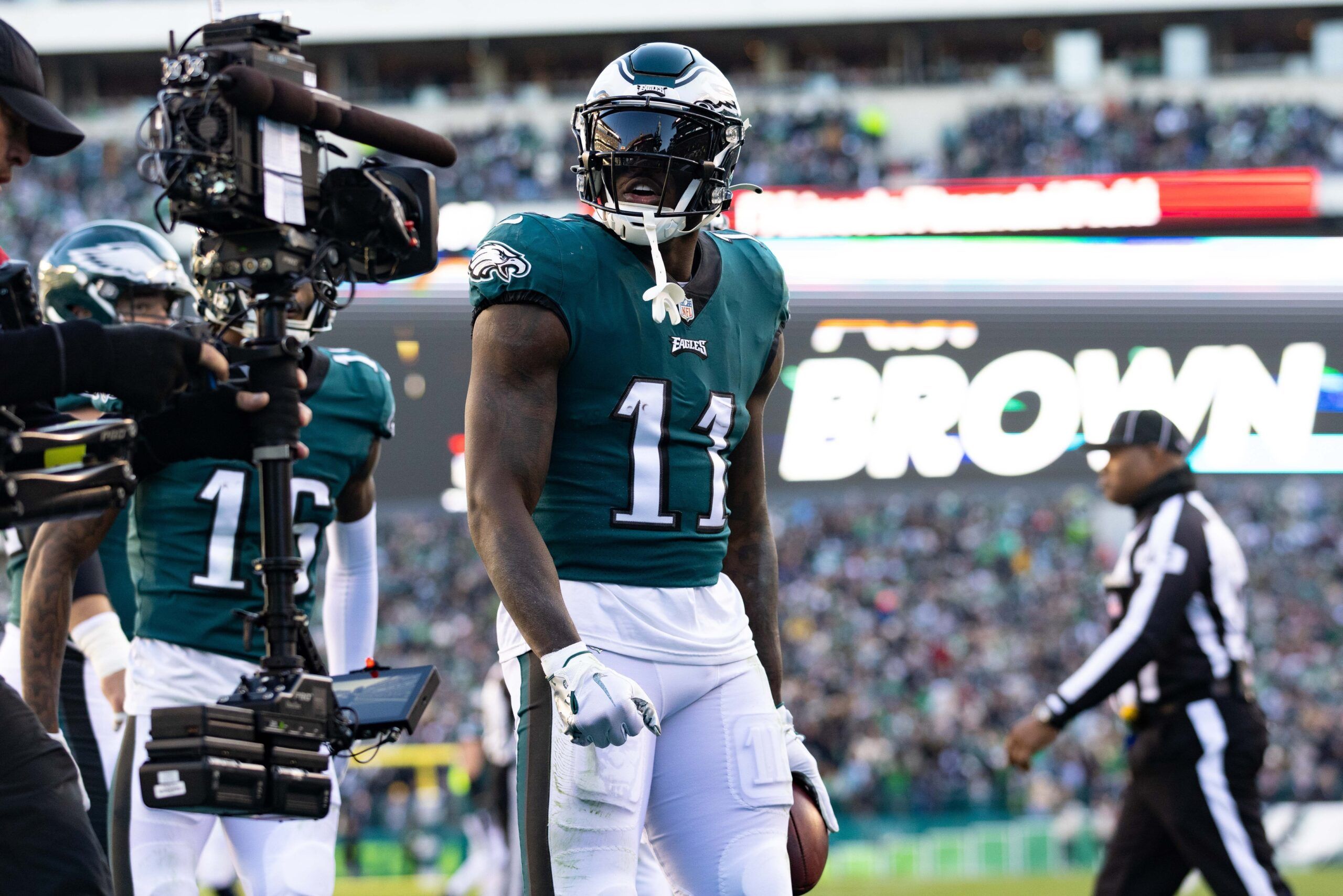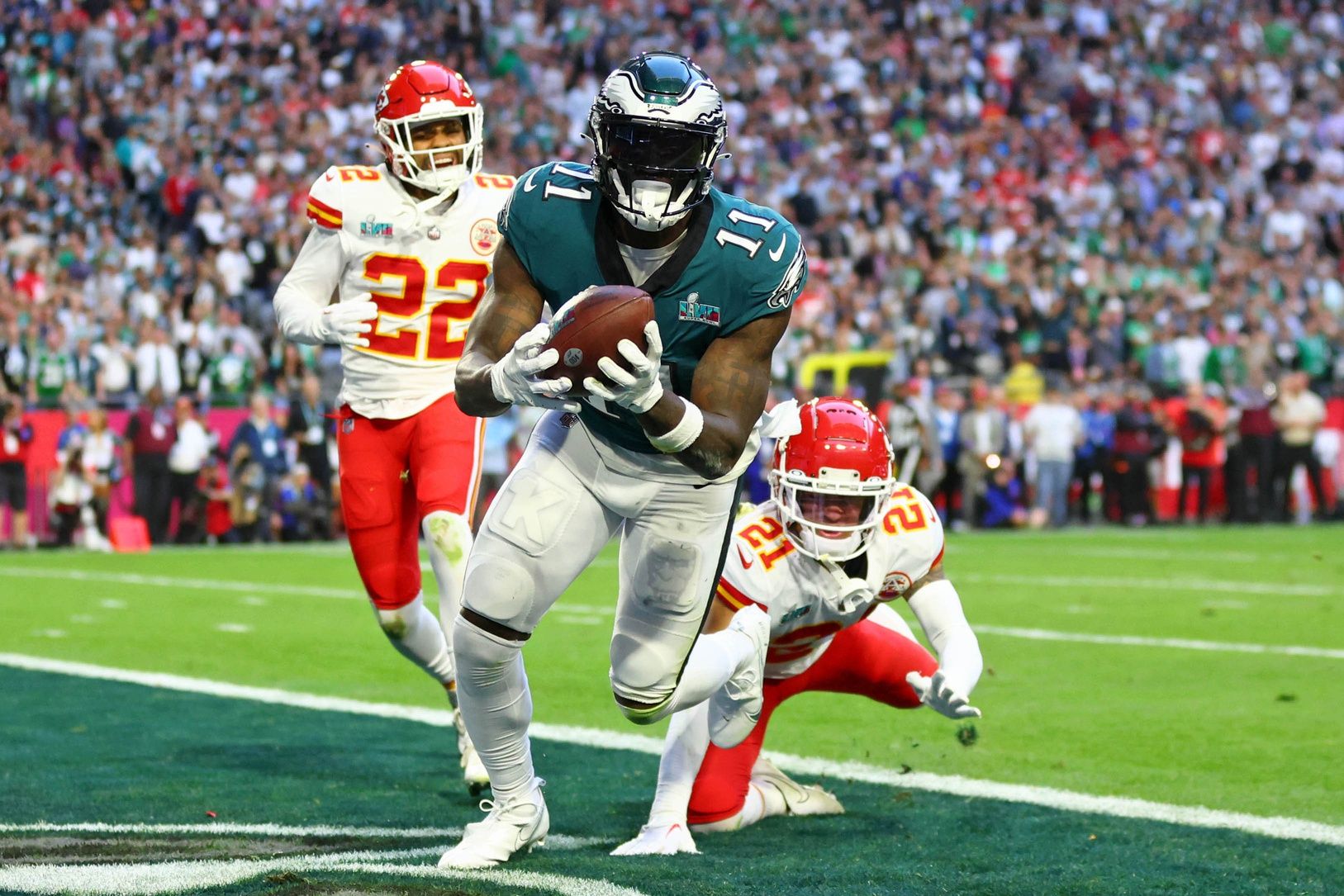One of the most impactful players of the 2022 NFL season, A.J. Brown, nearly wasn’t on the Philadelphia Eagles for that season as a member of the Tennessee Titans contracted through 2022 and likely 2023 after the fifth-year option would have been applied.
Instead, the Titans traded away one of the best receivers in the NFL to a team that used his talent to make a Super Bowl run, nearly winning it all after they made a move to grab the dynamic receiver.
The trade wasn’t as simple as the Titans attempting to extract as much value as they could or the Eagles suddenly finding value that no one else in the NFL could see, but it certainly looks bad for Tennessee after just one year.
A.J. Brown Trade Details
Brown was traded on the first night of the 2022 NFL Draft, on April 28.
The Eagles Received:
- Wide Receiver A.J. Brown
The Titans Received:
- The Eagles’ 2022 first-round pick, No. 18 overall (WR Treylon Burks)
- The Eagles’ 2022 third-round pick, No. 101 overall (TE Jeremy Ruckert)
The 101st pick was traded by the Titans to the Jets as part of a package that allowed Tennessee to move down for more picks when the Jets traded into the first round for Jermaine Johnson II.
In addition, the Eagles signed Brown to a four-year, $100 million extension.
Players Involved in the A.J. Brown Trade
There are three players directly involved in the Eagles’ trade for Brown. One of them was Brown himself, while the other two are Titans receiver Treylon Burks and Jets tight end Jeremy Ruckert.
Ruckert was selected with the 101st pick that was part of the package from the Eagles for Brown, but the Titans traded that pick away without making a selection. The Titans traded away that pick and their first-round pick (No. 26 overall) to the Jets and received a second-round pick, a third-round pick, and a fifth-round pick, selecting CB Roger McCreary, OT Nicholas Petit-Frere, and WR Kyle Philips.
Who Won the A.J. Brown Trade?

In Burks’ rookie year, he generated 444 receiving yards and 47 rushing yards. In the last decade, receivers drafted in the first two rounds who have had between 400 and 500 receiving yards have rarely found success. In fact, it was just one out of the 13 wide receivers who qualified. But that success was pretty big — Davante Adams.
Nevertheless, the odds don’t look good for Burks, and it’s unlikely he’ll ever get close to the production that Brown has achieved. By comparison, Brown hit 1,051 receiving yards his rookie year and last year earned 1,496 receiving yards for the Eagles.
Brown is fourth in Pro Football Network’s WR rankings. Though he nominally costs the Eagles $25 million a year, his cap hit has been relatively small because of the structure of the deal. Last year, he only consumed $5.7 million of the Eagles’ cap, and this year, he’ll only take up $8.3 million of it.
The biggest hit is in 2026 when he takes up $41.6 million, but they could easily work out an extension that resolves that problem and takes care of the void cap hit of $9.7 million in 2027.
On the surface, a first-round pick for a high-level receiver — like the multiple times Brandin Cooks has been subject to a deal, the Percy Harvin trade, the Stefon Diggs trade, and others — seem to make sense for both teams.
The problem for the Titans is that Brown played much better on his new team than many people expected, while their draft pick, Burks, underperformed rookie expectations. It wasn’t an issue when Diggs played like one of the best receivers in the NFL for Buffalo when the Vikings drafted Justin Jefferson to replace him.
In some instances, like with the Diggs situation, the team will often feel forced to trade the player. It wasn’t as if Brown tried to force himself out. He shortly tweeted, then deleted, a statement claiming that the trade wasn’t his fault.
He later expanded on the statement, telling ESPN’s Turron Davenport that the trade wasn’t his fault but that the Titans did provide him a “low offer,” adding that the deal they offered was $16 million per year with incentives to hit $20 million. He said he would have stayed if they had offered $22 million, $3 million dollars below the average he agreed to in Philadelphia.
It might have been a miscommunication or an issue regarding guarantees — the Eagles have ranked No. 1 in amount guaranteed at signing for deals since 2011, while the Titans have ranked 28th — but the Titans have offered a fair amount guaranteed at signing in the last five years, ranking ninth in the NFL in that regard. That means it’s unlikely to have been a cash flow issue.
With all of that in mind, it was probably a losing deal for the Titans at the beginning and looks like an even worse deal now. The Titans lost the trade, and the Eagles won the trade. Brown looks like a trade winner as well, while Burks could be a trade loser — if the Titans were the wrong team to develop him, he might have lost out on a substantially lucrative career.

